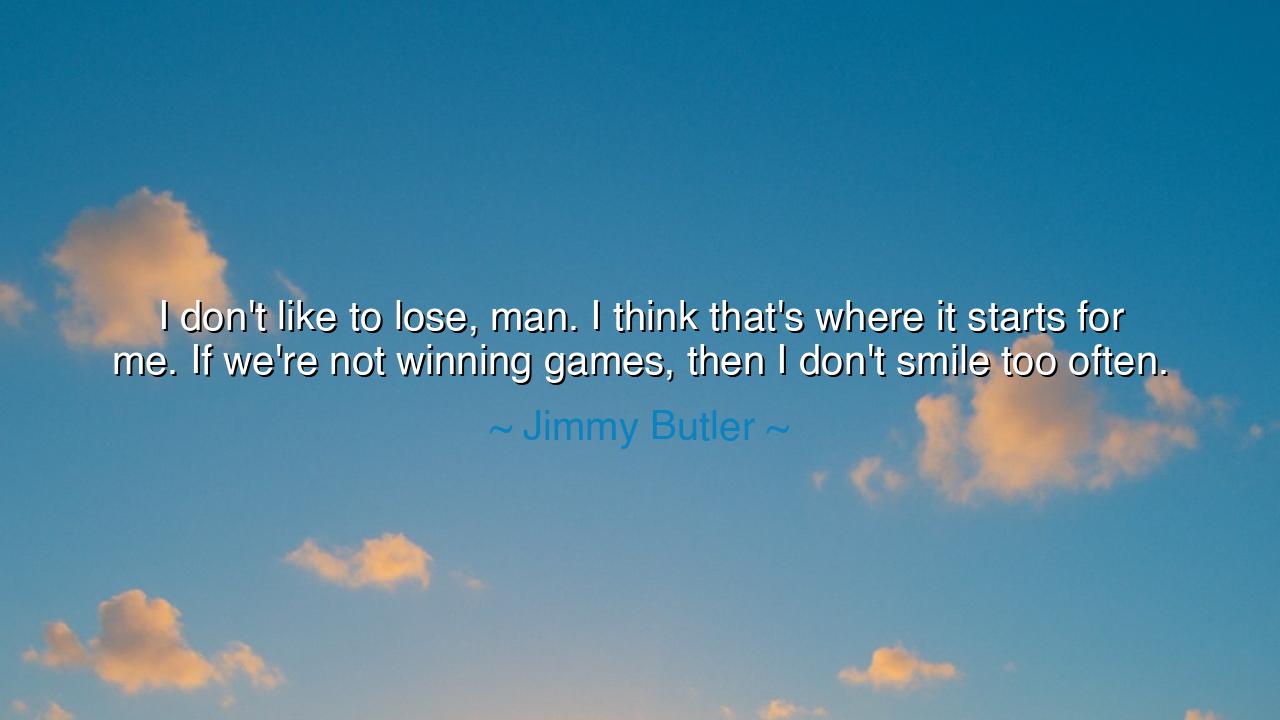
I don't like to lose, man. I think that's where it starts for me.
I don't like to lose, man. I think that's where it starts for me. If we're not winning games, then I don't smile too often.






The voice of Jimmy Butler, fierce and unyielding, speaks as though forged in the fire of battle: “I don't like to lose, man. I think that's where it starts for me. If we're not winning games, then I don't smile too often.” These are not words of idle pride, but the cry of a warrior whose spirit burns with the hunger for victory. In these lines lies the essence of the competitor’s heart: a refusal to settle for mediocrity, a relentless pursuit of triumph, and the recognition that joy itself is often born from the taste of conquest.
To say “I don’t like to lose” is to reveal a sacred truth about the human spirit: that we are not made to bow before defeat without struggle. Just as the athlete shuns loss, so too does the farmer resist famine, the soldier resists surrender, the poet resists silence. Life is not only about enduring, but about striving for excellence, about grasping the chance to lift oneself higher than the shadows of despair. Butler’s words remind us that victory is not a luxury but a necessity for the soul that dares to dream.
Consider the tale of Alexander the Great, who wept when no worlds remained for him to conquer. Though driven by ambition that some call pride, his tears showed the same fire that burns in Butler’s confession: joy was tied to triumph. Alexander could not smile in stagnation, for his soul craved the proving ground of battle. So it is with the competitor in sport, in art, in life—the smile blooms only when the heart knows it has poured forth its strength and prevailed.
Yet there is also humility in this saying, for Butler does not claim to smile at mere fortune. He ties his joy to the collective, to the winning of games, to the shared victory of his people. He does not smile when glory is absent, for his happiness is bound not to hollow appearances but to genuine achievement. This is the lesson of the ancients as well: the gladiator who stood in the arena did not smile for the crowd’s applause, but only when the contest was won and the sweat of his struggle bore fruit.
To dislike losing is not weakness, but passion. It is the flame that drives the warrior to train when others sleep, to sacrifice when others falter. But let this be tempered with wisdom: one must not despise failure so much that it robs the spirit of its strength. Defeat, though bitter, is the teacher that refines victory. The Roman general Scipio Africanus, when once humbled in early battle, used that sting of loss as a furnace to sharpen his will. Later, he would bring Carthage to its knees. Loss can wound, but it can also shape the soul into steel.
The teaching, then, is clear: let your hatred of defeat fuel your labor, but let it not blind you to its lessons. Smile not at false comfort, but at true victory—victory that comes through discipline, unity, and unyielding resolve. For a smile won cheaply fades quickly, but a smile born of struggle shines like the sun.
Therefore, those who walk this path should act thus: embrace your struggles as preparation, pour your soul into your craft, and let your joy be tied to the fruits of earnest labor. Do not pretend contentment in the face of loss, but let that discontent stir you to rise again with greater strength. And when you win, smile as the ancients smiled, knowing your triumph is pure, your heart unbroken, your spirit unyielding.
Carry forward Jimmy Butler’s truth: “If we’re not winning games, then I don’t smile too often.” Let it be a reminder that joy belongs not to the idle, but to the striving; not to the faint-hearted, but to the ones who dare to fight for greatness. In the end, the world remembers not those who surrendered to loss, but those who rose against it, carrying fire in their eyes and victory in their hands.






AAdministratorAdministrator
Welcome, honored guests. Please leave a comment, we will respond soon